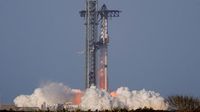Elon Musk Reinforces SpaceX's Ambitious Mars Plans
Elon Musk has reiterated that SpaceX aims to launch an uncrewed Starship to Mars by the end of 2026, aiming to set the stage for human landings on the Red Planet by 2029, although he admits that 2031 is more likely. Despite setbacks, the company continues to develop the world's most powerful launch vehicle, prepping for future interplanetary missions.
SpaceX CEO Elon Musk's goal of sending humans to Mars is taking center stage again as he announced via social media on March 14, 2025, that he anticipates launching an uncrewed Starship by the end of 2026. This radical ambition comes amidst ongoing development challenges after the vehicle's last two launches ended in explosive failures.
The Starship, which towers at a striking 400 feet, is designed to play a pivotal role in deep-space exploration, with Musk envisioning crewed missions potentially occurring in 2028. He noted, however, that while a human landing on Mars could happen as soon as 2029, the timeline may lean more towards 2031 when success appears more feasible. In a platform he owns, he shared his latest vision: "I believe that by 2026, we can send the uncrewed Starship on a mission to Mars."
Musk's plan is ambitious, especially since the Starship has yet to reach orbit in any of its eight uncrewed flight tests launched since 2023. The most recent demonstrations have ended tragically, with both resulting in dramatic explosions. The first explosion occurred on January 16, 2025, due to propellant leaks and fires, which caused a shut down of nearly all engines. The second mishap echoed this failure, occurring on March 6, 2025, prompting the Federal Aviation Administration's involvement to investigate the continued setbacks.
Despite these incidents, there are some silver linings. The Starship's Super Heavy rocket booster has successfully completed several crucial maneuvers, returning to the launch pad intact on three occasions, most notably during the last two tests, thanks to the innovation of SpaceX's giant mechanical arms known as chopsticks.
Adding a twist to his ambitions, Musk recently unveiled a creative promotion linked to the March Madness basketball tournament. SpaceX announced that participants in its bracket challenge, which involved predicting game outcomes, would have a chance to win a trip to Mars aboard Starship should they achieve a perfect bracket—a feat still waiting to be accomplished in history. Even if that goal proves unsurmountable, participants stand to win other prizes, including $250,000, free residential Starlink service for a year, or VIP viewing at a Starship launch.
Unfortunately, the rush towards Mars includes complexities. Musk's aspirations could clash with NASA's long-established agenda of returning humans to the Moon first under the Artemis program, setting the stage for eventual manned missions to Mars afterward. During his inauguration speech in January, President Donald Trump highlighted this shared vision with Musk, deviating from previous mentions of NASA's lunar objectives.
In Musk's eyes, however, achieving the Mars mission is crucial, aiming for life beyond Earth as an intrinsic part of humanity's survival. His grand vision, summarized in his statement that, "the day will come when we’re living on Mars," continues to inspire not only SpaceX staff but also legions of aspiring astronauts and space enthusiasts around the globe.
In conclusion, while pitfalls remain in the journey to establishing a human footprint on Mars, Elon Musk and SpaceX move forward with determination and creativity, pushing the boundaries of what is possible in commercial space travel.
Starship, despite its hurdles, continues to be a symbol of ambitions that extend far beyond our planet. Time will tell how soon Musk's vision might transform into reality, but for now, the journey is marked by perseverance, innovation, and an ever-growing determination to venture into the cosmos.


